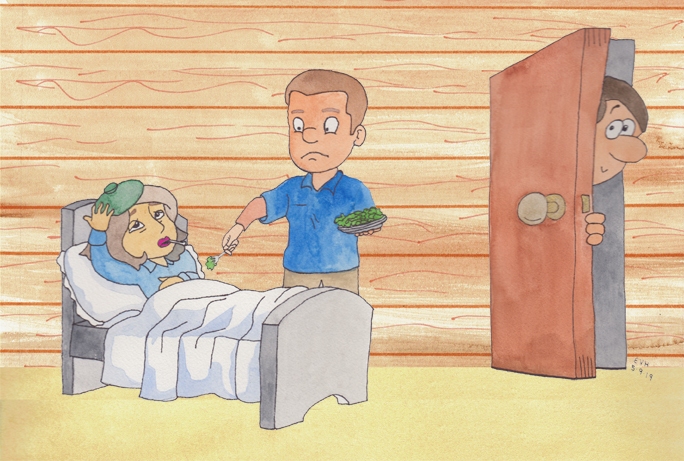
Jataka 130
Kosiya Jātaka
The Story of Kosiya
as told by Eric Van Horn
originally translated by Robert Chalmers, B.A., of Oriel College, Oxford University
originally edited by Professor Edward Byles Cowell, Cambridge University
This story does not sound much like something the Buddha would suggest although once again the Jātaka is a story from a previous life. Perhaps then the Bodhisatta would have suggested the “cure” for the lazy wife. Still, the story in the present seems to have been enough to make her reform.
“You may be sick or eat.” This story was told by the Master while he was at Jetavana. It about a woman of Sāvatthi. She is said to have been the wicked wife of a good and virtuous brahmin, a man who was a lay follower of the Buddha. She spent her nights gallivanting about looking for entertainment. But during the day she did not do a stroke of work. Instead she lay about groaning and pretending to be sick.
“What is the matter with you, my dear?” her husband said.
“My stomach troubles me.”
“What can I get for you?”
“Sweets, savory dishes, rich food, rice porridge, boiled rice, oil, and so forth.”
The obedient husband did as she wished. He worked like a slave for her. She stayed in bed while her husband was in the house, but as soon as he left, she was in the arms of other men.
“My poor wife doesn't seem to get any better from her illness,” the brahmin thought. So he took offerings of perfumes, flowers, and the like, to the Master at Jetavana. Having shown his respect, he stood before the Blessed One who asked him why he had been absent from the monastery for so long.
“Sir,” the brahmin said, “My wife is troubled with a stomach illness, and I spend a great deal of time to keep her supplied with every conceivable delicacy. Now she seems strong enough and her complexion is clear, but her digestion is as troublesome as ever. It is because I have been taking care of my wife that I have not had any time to come here, sir.”
The Master knew about the wife’s wickedness. He said, “Ah! Brahmin, the wise and good of days gone by taught you how to care for a woman suffering like your wife from such a stubborn ailment. But rebirth has confused your memory so that you have forgotten.” So saying, he told the following story of the past.
Once upon a time when Brahmadatta was reigning in Benares, the Bodhisatta was born as a brahmin in a very distinguished family. After completing his education at Takkasilā University, he became a teacher of world-wide fame in Benares. The young nobles and brahmins from all the princely and wealthy families flocked to him.
Now a country brahmin, who had learned the three Vedas and the 18 sciences from the Bodhisatta traveled to Benares to look after his estate. On these excursions he would go to listen to the Bodhisatta’s teachings two or three times a day.
(There are 18 sciences in ancient Indian philosophy. The first four are the Vedas. The second four are the four subsidiary Vedas: Ayurveda [medicine], Dhanurveda [weaponry], Gandharvaveda [music], and Arthasastra [civics]. The last 12 sciences are Purana [stories], Nyaya [logic], Mlmamsa [philosophy], DharmaSastra and Vedanga [dharmas], and the six auxiliary sciences: phonetics, grammar, poetry, astronomy, ritual, and philology.)
This brahmin had a wife who was a bad, wicked woman. And everything came to pass as above. When the brahmin explained how it was that he could not get away to listen to his Master’s teachings, the Bodhisatta, who knew that the brahmin’s wife was only pretending to be sick, thought to himself, “I will tell him what medicine will cure the creature.”

Figure: Oh, the Tangled Web We Weave!
So he said to the brahmin, “Do not give her any more delicacies, my son. Instead collect some cow manure. Put five different kinds of fruit in it, and let them pickle in a new copper pot until the whole lot smells like the metal. Then take a rope or cord or stick and go to your wife, and tell her plainly she must either swallow the cure you have brought her, or else she must work for her food. (And here you will repeat certain lines which I will tell you.) If she refuses the remedy, then threaten to let her have a taste of the rope or stick, and to drag her about by the hair while you beat her with your fists. You will find that with this threat she will be up and about her work.”
So off went the brahmin. He brought his wife the mess prepared as the Bodhisatta had directed.
“Who prescribed this?” she said.
“The Master,” her husband said.
“Take it away. I won't have it.”
“So you won't have it, eh?” the young brahmin said. He picked up the rope. “Well then, you’ve either got to take that cure or else work for honest fare.” So saying he uttered this stanza:
You may be sick or eat; which shall it be?
For you can’t do both, my Kosiyā.
Terrified by this, the woman Kosiyā realized that from the moment the Master interfered, how impossible it was to trick him. So she got up and went about her work. And the Master knew from reading her consciousness that she had given up her wickedness, and she became as good as she had formerly been wicked.
So ended the story. The brahmin’s wife knew that the All-Enlightened Buddha knew what she was. She stood in such awe of him that she never misbehaved again.
His lesson ended, the Master identified the birth by saying, “The husband and wife of today were the husband and wife of the story, and I was the Master.”
